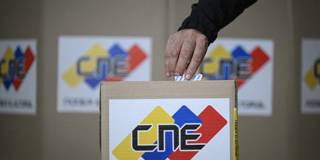Ever since the Venezuelan military tried to overthrow President Hugo Chávez in 2002, Cuba has posted thousands of doctors, nurses, sports instructors, security advisers, and intelligence agents in the country. They are the main reason why Nicolás Maduro has not been ousted after the fraudulent July 28 presidential election.
MEXICO CITY – On January 23, 1958, a group of Venezuelan military officers overthrew the brutal dictator Marcos Pérez Jimenez, who had ruled for six years – longer than he deserved – thanks to an oil bonanza. Soon, elections were held, ushering in a 40-year period of representative democracy, underpinned by a vibrant civil society, high oil prices (for the most part), and concomitant increases in spending and corruption, with the latter being largely tolerated. It was only in the mid-1990s that lower oil prices and economic stagnation brought an end to the Punto Fijo Pact, named after the city where Venezuela’s major political parties negotiated a power-sharing arrangement and agreed to respect election results.

MEXICO CITY – On January 23, 1958, a group of Venezuelan military officers overthrew the brutal dictator Marcos Pérez Jimenez, who had ruled for six years – longer than he deserved – thanks to an oil bonanza. Soon, elections were held, ushering in a 40-year period of representative democracy, underpinned by a vibrant civil society, high oil prices (for the most part), and concomitant increases in spending and corruption, with the latter being largely tolerated. It was only in the mid-1990s that lower oil prices and economic stagnation brought an end to the Punto Fijo Pact, named after the city where Venezuela’s major political parties negotiated a power-sharing arrangement and agreed to respect election results.